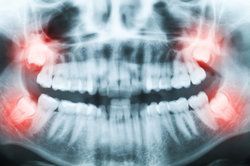Get in touch
(334) 277-3492
messages@jawdocs.net
(334) 277-3492
LOCATIONS PATIENT REGISTRATION
Removing Impacted Wisdom Teeth
The third molars, or wisdom teeth, will typically erupt between the ages of 17 and 25. Because the jaws are often only able to comfortably accommodate 28 teeth, third molars can cause complications. Impaction occurs when wisdom teeth fail to fully erupt. Under these circumstances, the third molars can damage the jaw and surrounding teeth, resulting in considerable pain and other symptoms. We specialize in removing impacted wisdom teeth at our Montgomery oral surgery practice. If you have been diagnosed with impacted wisdom teeth, or have been experiencing symptoms, please contact our office to make an appointment with one of our oral surgeons.
Impacted Wisdom Teeth Require Special Care
Wisdom teeth should ideally erupt straight out of the gums into proper alignment with your second molars. Frequently, wisdom teeth erupt at an angle, becoming stuck in the jawbone or interfering with surrounding teeth. General dentists often refer patients to us because we have the training, technology, and expertise to remove impacted wisdom teeth and preserve the integrity of the jaw and surrounding teeth. Removing impacted wisdom teeth can require making a surgical opening in the gums and removing bone tissue covering the teeth. Our team of oral surgeons has the advanced training and expertise to handle all types of impactions, and will use the least invasive approach possible to remove your wisdom teeth.
Complications of Impacted Wisdom Teeth
Impacted wisdom teeth can cause a number of adverse health conditions:
- Damage to other teeth: Wisdom teeth can cause overcrowding of your jaw, and the pressure exerted on the immediate surrounding teeth can cause trauma, leaving the entire area susceptible to infection.
- Cysts and tumors: Wisdom teeth develop in a hollow space within the jawbone. If this area fills with fluid, it can form a cyst that can damage the bone, teeth, and nerves. Very rarely, this condition can cause a tumor to develop.
- Tooth decay: Partially impacted wisdom teeth are notoriously difficult to clean, which leaves them more susceptible to decay because bacteria can more easily collect, forming plaque and tartar.
- Periodontal disease: When bacteria accumulate on the soft tissues surrounding the wisdom teeth, the likelihood of developing inflammatory gum disease increases.
When to Seek Treatment
Undergoing regular dental exams is essential throughout your life, but during early adulthood, it is especially important to maintain these visits so your dentist can monitor the development of your wisdom teeth. Most patients see their dentist every six months, but between the ages of 17 and 25, physiological changes can occur rapidly, so it is important to be aware of the symptoms of an impacted wisdom tooth, and to know when to seek treatment. These symptoms include:
- Pain in the back of your jaw
- Inflamed, bleeding, or swollen gums
- Headaches
- A persistent bad taste in your mouth
- Persistent halitosis
Make a Wisdom Teeth Evaluation Appointment
If you have experienced any painful symptoms, or if your dentist has diagnosed impacted wisdom teeth, please contact our office to schedule a consultation with one of our oral surgeons.

